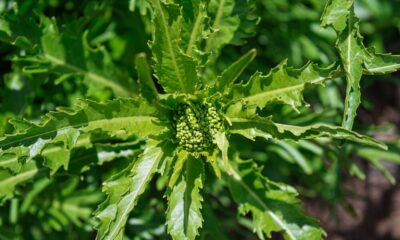What is Wild Lettuce?
Wild lettuce, scientifically known as Lactuca Virosa, is a biennial plant belonging to the Asteraceae family. Native to Europe and Asia, this herbaceous species is widely cultivated for its medicinal and culinary uses. Also referred to as “opium lettuce” due to its mild sedative effects, wild lettuce has a long history of traditional use dating back to ancient civilizations.
The plant has deeply lobed leaves and little yellow flowers that bloom in bunches. It normally reaches a height of 3 to 7 feet. You can find wild lettuce growing in meadows, woodlands, and by the sides of roads in temperate areas. Because of its adaptability and persistence, it is frequently seen in both urban and rural environments.
Wild lettuce has long been valued for its medicinal qualities as well as being seen as a representation of life and wellbeing. Ancient societies, including the Greeks, Romans, and Egyptians, appreciated the sedative, analgesic, and anti-inflammatory qualities of wild lettuce. It was frequently applied to reduce pain, encourage calmness, and bring on sleep.
In contemporary times, wild lettuce continues to be cherished for its medicinal benefits and is widely used in herbal medicine practices around the world. Its leaves and sap contain a milky latex substance known as lactucarium, which is rich in bioactive compounds such as lactucin and lactucopicrin. These compounds are believed to contribute to the plant’s sedative and analgesic effects, making it a popular remedy for conditions such as insomnia, anxiety, and migraine headaches.
Despite its long history of traditional use, wild lettuce remains a subject of scientific inquiry, with ongoing research aimed at uncovering its pharmacological properties and potential therapeutic applications. As interest in natural remedies and alternative medicine continues to grow, wild lettuce holds promise as a valuable botanical resource for promoting health and well-being.
Can We Eat Wild Lettuce
The answer is that wild lettuce is edible, and you can eat the leaves and stems of the plant. Nevertheless, care must be taken when gathering and cooking wild lettuce for eating. Some people may find the bitter flavour of certain wild lettuce species to be intolerable.
Furthermore, some people may respond negatively to some substances found in wild lettuce, particularly if they ingest excessive amounts of it or if they have particular sensitivities or allergies.
Consequently, it is best to start modestly while consuming wild lettuce in order to monitor your body’s response and make sure the plant is being harvested in a clean and healthy setting.
As with any wild plant, it is crucial to positively identify the species and to avoid harvesting from areas that may be exposed to pollutants or pesticides. If you have any concerns or medical conditions, it is best to consult with a healthcare professional before consuming wild lettuce or any other wild plant for culinary or medicinal purposes.
The Medicinal Uses of Wild Lettuce
Wild lettuce has a long history of use in traditional medicine for its various medicinal properties. From alleviating pain to promoting relaxation, this versatile plant offers a range of therapeutic benefits that have been recognized and valued for centuries.
1. Pain relief:
Wild lettuce has been traditionally used to alleviate pain associated with various conditions such as headaches, muscle aches, and joint pain. Research suggests that wild lettuce contains compounds like lactucin and lactucopicrin, which exhibit analgesic properties by acting on the central nervous system to reduce pain perception (source).
2. Sedative properties:
The milky sap of wild lettuce contains lactucarium, a substance known for its sedative effects. Studies have shown that lactucarium acts as a mild sedative and can help promote relaxation and improve sleep quality (source).
3. Anxiety and stress relief:
Wild lettuce may help alleviate symptoms of anxiety and stress due to its calming effects on the nervous system. Research indicates that wild lettuce extracts have anxiolytic properties, making them useful in managing stress and anxiety (source).
4. Respiratory support:
Wild lettuce has been used to relieve respiratory conditions such as asthma and bronchitis. Studies suggest that compounds in wild lettuce possess expectorant and bronchodilator effects, which can help improve breathing and relieve coughs (source).
5. Digestive aid:
The bitter compounds in wild lettuce can stimulate digestive function, improve appetite, and alleviate symptoms of indigestion. Research shows that wild lettuce extracts may have gastroprotective effects and help reduce gastric acid secretion (source).
6. Mild diuretic:
Wild lettuce can act as a mild diuretic, promoting urine production and helping to eliminate excess fluid and toxins from the body. Studies suggest that wild lettuce extracts may increase urine output and support kidney function (source).
7. Anti-inflammatory effects:
Compounds found in wild lettuce may help reduce inflammation and swelling, making it beneficial for conditions such as arthritis. Research indicates that wild lettuce extracts exhibit anti-inflammatory activity by inhibiting inflammatory mediators (source).
8. Nervous system support:
Wild lettuce is believed to have a tonic effect on the nervous system, helping to calm nerves and reduce irritability. Studies suggest that wild lettuce extracts may modulate neurotransmitter levels in the brain, contributing to its calming effects (source).
9. Menstrual cramp relief:
Some women use wild lettuce to alleviate menstrual cramps and discomfort during menstruation. While scientific research on this specific use is limited, anecdotal evidence suggests that wild lettuce may help reduce menstrual pain and cramping.
10. Fever reducer:
Wild lettuce has been traditionally used to lower fever and promote sweating during febrile illnesses. However, more research is needed to fully understand its mechanisms of action and effectiveness in reducing fever.
11. Antispasmodic properties:
Wild lettuce may help relieve muscle spasms and cramps due to its antispasmodic effects on smooth muscle tissue. Studies suggest that wild lettuce extracts can relax muscle contractions and alleviate spasms (source).
12. Liver support:
Consuming wild lettuce may support liver function and detoxification processes. While there is limited direct research on this aspect, the liver-supporting properties of bitter herbs like wild lettuce are well-documented in traditional medicine (source).
13. Hypnotic effects:
Wild lettuce preparations have been used to induce a state of mild euphoria and relaxation, promoting restful sleep and reducing insomnia. Studies suggest that wild lettuce extracts may have sedative-hypnotic effects, aiding in sleep induction (source).
14. Traditional remedy for opiate withdrawal:
Wild lettuce has been historically used as a natural remedy to help ease symptoms of opiate withdrawal, such as anxiety, restlessness, and insomnia. While scientific evidence is limited, anecdotal reports suggest that wild lettuce may offer relief during the withdrawal process.
15. Skin conditions:
Wild lettuce sap has been applied topically to soothe skin irritations, rashes, and insect bites. While there is limited scientific research on this specific use, the anti-inflammatory and analgesic properties of wild lettuce may help alleviate skin discomfort (source).
Potential Side Effects of Wild Lettuce
1. Allergic reactions:
Some individuals may experience allergic reactions to wild lettuce, leading to symptoms such as skin rash, itching, swelling, or difficulty breathing. Allergic reactions can vary in severity, and it’s essential to discontinue use if any adverse reactions occur (source).
2. Gastrointestinal discomfort:
Consuming wild lettuce may cause gastrointestinal discomfort in some people, including symptoms like nausea, vomiting, diarrhea, or abdominal pain. These effects can be due to the bitter compounds present in wild lettuce, which may irritate the digestive tract (source).
3. Drowsiness and dizziness:
Wild lettuce’s sedative properties may cause drowsiness or dizziness, especially when consumed in large amounts or in combination with other sedative substances. These effects can impair cognitive function and motor skills, increasing the risk of accidents or injuries (source).
4. Hypotension:
Some individuals may experience a drop in blood pressure after consuming wild lettuce, leading to symptoms of hypotension such as lightheadedness, fainting, or weakness. Individuals with low blood pressure or those taking antihypertensive medications should use wild lettuce with caution (source).
5. Photosensitivity:
Certain compounds in wild lettuce sap may increase sensitivity to sunlight, leading to sunburn or skin irritation upon exposure to UV rays. Individuals using wild lettuce topically should avoid prolonged sun exposure to prevent skin reactions (source).
6. Potential drug interactions:
Wild lettuce may interact with certain medications, including sedatives, antihypertensives, and blood thinners. These interactions can potentiate the effects of medications or interfere with their metabolism, leading to adverse reactions or reduced efficacy (source).
7. Liver toxicity:
In rare cases, excessive consumption of wild lettuce may lead to liver toxicity or liver damage. This adverse effect is more likely to occur with prolonged or high-dose use of wild lettuce preparations (source).
8. Respiratory depression:
Wild lettuce’s sedative properties may cause respiratory depression in susceptible individuals, particularly those with respiratory conditions like asthma or chronic obstructive pulmonary disease (COPD). Respiratory depression can lead to breathing difficulties or even respiratory failure in severe cases (source).
9. Pregnancy and breastfeeding:
Pregnant and breastfeeding women should avoid using wild lettuce due to a lack of safety data. Wild lettuce may exert uterine-stimulating effects and pose risks to fetal development or infant health (source).
10. Psychological effects:
In some cases, wild lettuce may induce psychological effects such as confusion, hallucinations, or altered perception. These effects are more likely to occur with high doses or prolonged use of wild lettuce and can be distressing or disorienting (source).

















 Health & Wellness4 months ago
Health & Wellness4 months ago


 Love & Relationship2 months ago
Love & Relationship2 months ago


 Health & Wellness3 months ago
Health & Wellness3 months ago


 Health & Wellness4 months ago
Health & Wellness4 months ago


 Food & Recipes4 months ago
Food & Recipes4 months ago


 Health & Wellness4 months ago
Health & Wellness4 months ago


 Food & Recipes2 months ago
Food & Recipes2 months ago


 Health & Wellness3 months ago
Health & Wellness3 months ago






















